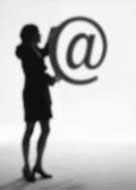-
-
-
-
-
-
-
-
-
-
Missing or Insufficient Contact Information
 You want to make it easy
for prospective employers and others to contact you. Recruiters usually have multiple applicants for each job.
If it is difficult to contact you, other applicants may gain an advantage. Be sure your resume provides multiple
ways to contact you. A current email address is essential. Providing cell phone and other means of reaching
you in a timely way can help you stay connected. If you have a smart phone or similar device, set it up to receive
email.
You want to make it easy
for prospective employers and others to contact you. Recruiters usually have multiple applicants for each job.
If it is difficult to contact you, other applicants may gain an advantage. Be sure your resume provides multiple
ways to contact you. A current email address is essential. Providing cell phone and other means of reaching
you in a timely way can help you stay connected. If you have a smart phone or similar device, set it up to receive
email.
Including Irrelevant Information
 Due to high volumes, very
little time is spent in the initial screening of individual resumes. This screening is often done via electronic
means. Putting irrelevant information in your resume can substantially reduce your chances for an interview.
Review your resume with a critical eye and get rid of information that is not necessary to adequately cover
your background or isn't relevant to the job you are applying for. By keeping your resume crisp, relevant
and easy to read, you'll improve your chances for an interview.
Due to high volumes, very
little time is spent in the initial screening of individual resumes. This screening is often done via electronic
means. Putting irrelevant information in your resume can substantially reduce your chances for an interview.
Review your resume with a critical eye and get rid of information that is not necessary to adequately cover
your background or isn't relevant to the job you are applying for. By keeping your resume crisp, relevant
and easy to read, you'll improve your chances for an interview.
Not Including Keywords
 Automated systems are often used to do
an initial screening of resumes. These systems search resumes for words that are a close match to the key requirements
of the job. Check job advertisements, posted job descriptions and other descriptors of the job requirements.
Identify words that are descriptive of the important elements of the job and, where appropriate, incorporate
these words into your resume.
Automated systems are often used to do
an initial screening of resumes. These systems search resumes for words that are a close match to the key requirements
of the job. Check job advertisements, posted job descriptions and other descriptors of the job requirements.
Identify words that are descriptive of the important elements of the job and, where appropriate, incorporate
these words into your resume.
Bad Spelling and Poor Grammar
 While not critical for every
job, spelling or grammar errors are likely to get you overlooked for most jobs. That doesn't mean you have
to use "text book" grammar, but you should demonstrate a reasonable command of the language. Most
word processing and email programs include a spell checker ... use it. It can also be helpful to have your resume
reviewed by a friend, spouse or business associate. They can offer suggestions and help spot overlooked errors.
While not critical for every
job, spelling or grammar errors are likely to get you overlooked for most jobs. That doesn't mean you have
to use "text book" grammar, but you should demonstrate a reasonable command of the language. Most
word processing and email programs include a spell checker ... use it. It can also be helpful to have your resume
reviewed by a friend, spouse or business associate. They can offer suggestions and help spot overlooked errors.
Not Writing for Your Intended Audience
 The people who review your resume
are decision-makers. Each one will make a decision about whether to proceed further with your resume or put
it aside in favor of other applicants. Think about what these decision makers are looking for and write your
resume accordingly. Put yourself in their position and consider the kinds of things you'd like to see in
the ideal resume. This will help you focus your attention on the particular needs of those reviewing your resume.
The people who review your resume
are decision-makers. Each one will make a decision about whether to proceed further with your resume or put
it aside in favor of other applicants. Think about what these decision makers are looking for and write your
resume accordingly. Put yourself in their position and consider the kinds of things you'd like to see in
the ideal resume. This will help you focus your attention on the particular needs of those reviewing your resume.
Using the Same Resume for Every Job
 Just as each recruiter and hiring
manager are different, so are the needs of employers. It makes sense that there is no single resume that will
meet the needs of all employers or job descriptions. Craft each resume to fit the particular needs of the employer
and job you are applying for. While this takes extra time, it will greatly improve your chances of being selected
for an interview. Be sure you keep track of which resume version you send to each employer.
Just as each recruiter and hiring
manager are different, so are the needs of employers. It makes sense that there is no single resume that will
meet the needs of all employers or job descriptions. Craft each resume to fit the particular needs of the employer
and job you are applying for. While this takes extra time, it will greatly improve your chances of being selected
for an interview. Be sure you keep track of which resume version you send to each employer.
A Focus on Duties vs. Accomplishments
 Resumes that simply list
the duties and responsibilities of your previous jobs say little about how well you may have performed. Nor
do they provide an indicator of how you might perform in a new role. This is why it is important to also list
notable accomplishments. Think about the things you have done in the past that relate to the requirements of
the new job. If you improved quality, received awards, reduced costs, enhanced customer service, etc, note those
accomplishments in your resume.
Resumes that simply list
the duties and responsibilities of your previous jobs say little about how well you may have performed. Nor
do they provide an indicator of how you might perform in a new role. This is why it is important to also list
notable accomplishments. Think about the things you have done in the past that relate to the requirements of
the new job. If you improved quality, received awards, reduced costs, enhanced customer service, etc, note those
accomplishments in your resume.
A Resume that is Too Long or Too Short
 The primary purpose of a resume
is to get you a job interview. While there are no hard rules about resume length, a resume that is too long
or too short is likely to fall short of that goal. Your resume should be of adequate length to concisely portray
your background and the benefits you would bring to a new employer. Make sure your resume is easy to read and
is focused on skills and accomplishments that will help set you apart from other applicants.
The primary purpose of a resume
is to get you a job interview. While there are no hard rules about resume length, a resume that is too long
or too short is likely to fall short of that goal. Your resume should be of adequate length to concisely portray
your background and the benefits you would bring to a new employer. Make sure your resume is easy to read and
is focused on skills and accomplishments that will help set you apart from other applicants.
Using the Wrong Type of Resume
 Resumes types are usually described
as chronological, functional or hybrid. Choosing the right type for your situation is important to getting you
noticed. If you have a good career history, a chronological resume is almost always your best choice. Having
a limited work history or modest career progression may warrant a functional resume. A hybrid resume is a combination
of the previous two. See the Job Hunter Pro eBook for details about resume types and formats.
Resumes types are usually described
as chronological, functional or hybrid. Choosing the right type for your situation is important to getting you
noticed. If you have a good career history, a chronological resume is almost always your best choice. Having
a limited work history or modest career progression may warrant a functional resume. A hybrid resume is a combination
of the previous two. See the Job Hunter Pro eBook for details about resume types and formats.
A Poorly Written Goal or Summary
 When including a career goal
or summary in your resume, be sure it is focused on the job you are applying for and the needs of the employer.
Use keywords from the job posting to help get you noticed. Write goals and career summaries as if they were
the only information provided by your resume. Make them focused and concise so the recruiter or hiring manager
can immediately see the value you would bring to the organization.
When including a career goal
or summary in your resume, be sure it is focused on the job you are applying for and the needs of the employer.
Use keywords from the job posting to help get you noticed. Write goals and career summaries as if they were
the only information provided by your resume. Make them focused and concise so the recruiter or hiring manager
can immediately see the value you would bring to the organization.
Previous
Next
How does your resume stack up?
Recruiters and hiring managers often complain about the quality of the resumes they receive. Because they usually receive
a large number of resumes for each open position, screening resumes is time-consuming; and often frustrating.
Above, you'll find a compilation of frequently heard complaints from recruiters and hiring managers. Avoiding these
pitfalls can improve your chances of getting noticed and being contacted for an interview. See the Job Hunter Pro eBook
for details about writing an effective resume.